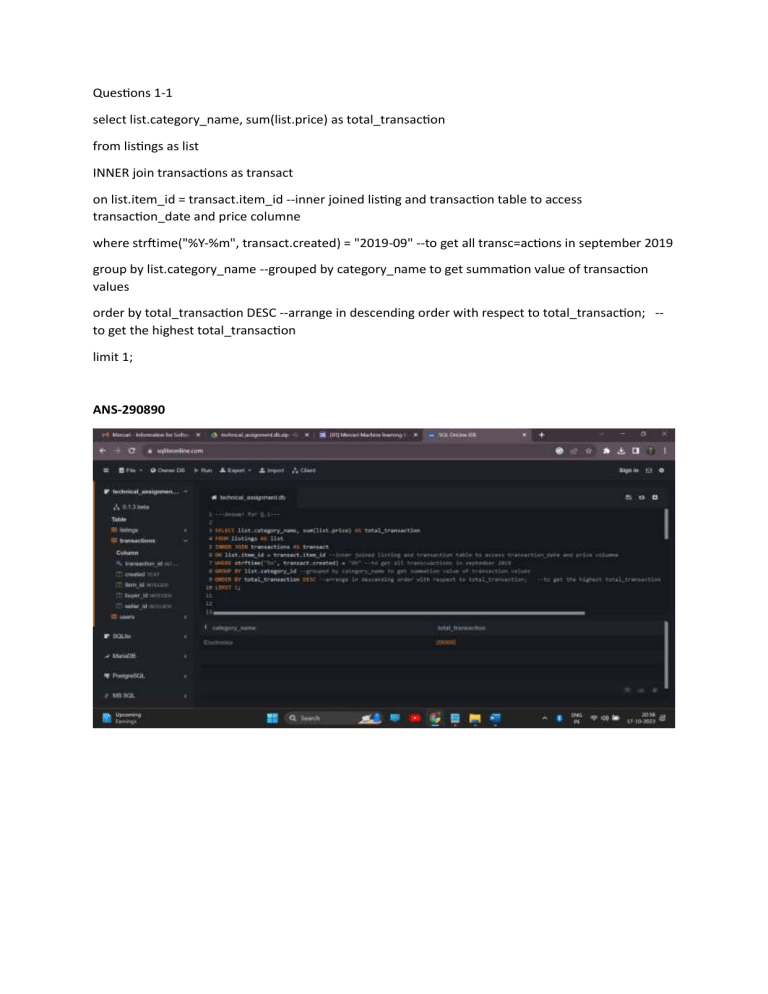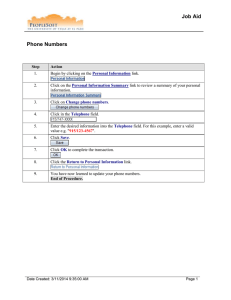
Questions 1-1 select list.category_name, sum(list.price) as total_transaction from listings as list INNER join transactions as transact on list.item_id = transact.item_id --inner joined listing and transaction table to access transaction_date and price columne where strftime("%Y-%m", transact.created) = "2019-09" --to get all transc=actions in september 2019 group by list.category_name --grouped by category_name to get summation value of transaction values order by total_transaction DESC --arrange in descending order with respect to total_transaction; -to get the highest total_transaction limit 1; ANS-290890 ---Answer for Q.1-2--- with table1 AS --table 1 calculated the total number of users whose first and second listing are of same category from total users with atleast two listings (select count(*) c1 from (select *, -- subquery to get rows with users whose first and second listing are of same category rank() over(partition by lister_id order by created) as R, --to get the rank in created date for every lister_id lag(category_name) over(partition by lister_id order by created) as L -- one lag to match first and second listing per user from listings where lister_id in (select lister_id -- subquery to return users with atleast two listings from listings group by lister_id having count(lister_id) >= 2)) as x where x.R=2 and x.L=x.category_name), table2 AS --table 2 calculated the total number of users with atleast two listings (select count(distinct lister_id) c2 from listings where lister_id in (select lister_id from listings group by lister_id having count(lister_id) >= 2)) Select round(cast(c1 as real)*100/cast(c2 as real), 1) percentage from table1, table2 -- query to return percentage of required users using results from table1 and table2 ANS-34.1 --Answer for Q.1-3---column then category_id to get summation value of transaction values select list.category_name, strftime("%Y-%m", transact.created) as month, avg(list.price) as average_value_per_transaction from listings list inner join transactions transact --inner joined listing and transaction table to access transaction_date and price on list.item_id = transact.item_id group by month, list.category_name --grouped by month and category_name to get monthly average transactions for each category per month order by month, category_name; --order by month and category_name to visualize better the monthly averages for each category e Question 2: In python #stack initialization St1= [ ] St2 = [] #enqueue operation O(1) worst case X = input() St1.append(x) #dequeue O(N+N)=O(N) # worst time complexity where N is the number of elements because 2 for loop run for N time each l1 = len(st1) For i in range(l1): St2.append(st1.pop(-1)) St2.pop(-1) l2 = len(st2) For i in range(l2): St1.append(st2.pop(-1))

![-----Original Message----- From: g lister [ ]](http://s2.studylib.net/store/data/015588303_1-ae35835d3eb0760981a742c87ff19ce8-300x300.png)
